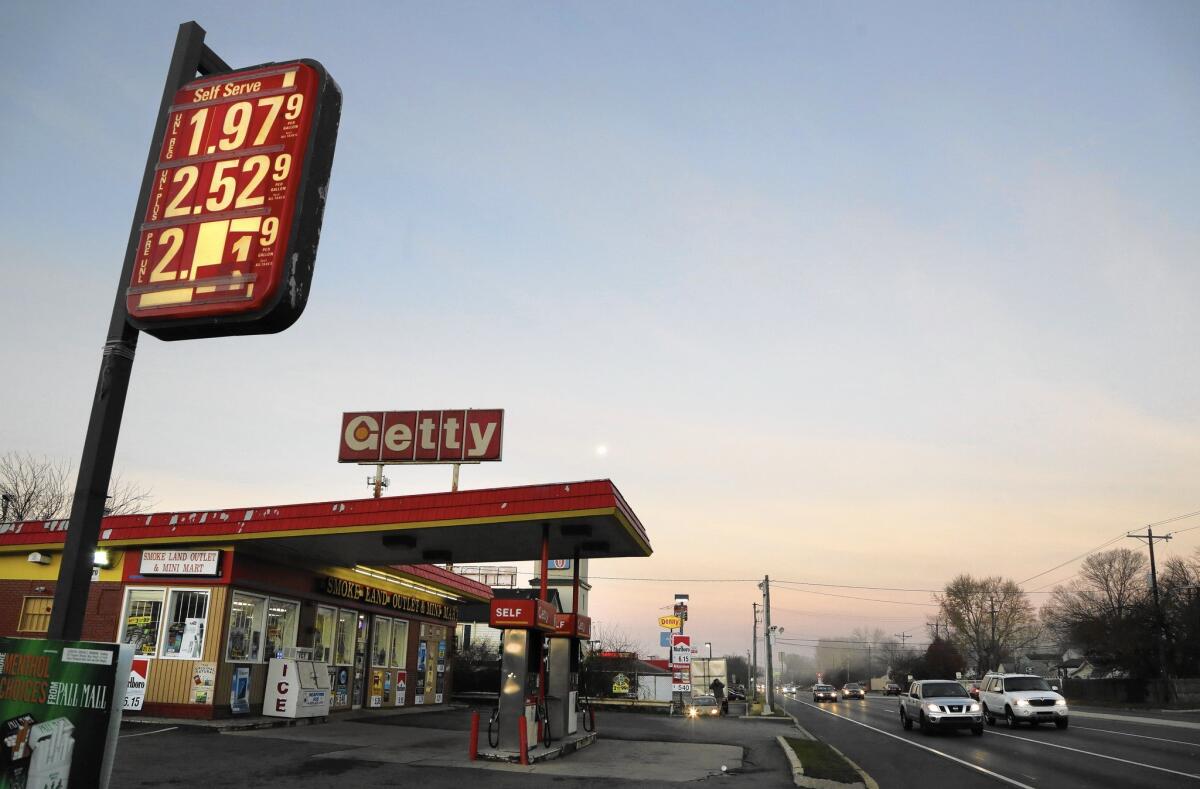L.A. motorists are paying 75 cents more than U.S. average for a gallon of gas

A Newark, Del., service station was charging $1.979 for a gallon of regular gas Friday. The national average was $2.038 Tuesday.
Much of the nation is paying $2 or less for a gallon of regular gasoline for the first time since spring 2009.
But in California, drivers are shelling out significantly more — and the price gap has gotten wider in recent weeks.
The Los Angeles area has been hit particularly hard.
L.A. motorists are paying an average price that is 75 cents a gallon more than the national average, compared with a 30-cent difference a year earlier. Fuel experts attribute the increased disparity largely to refinery outages.
“Certainly, no doubt about it, prices remain higher than normal, not just in Southern California but around the state,” said Gordon Schremp, a senior fuels specialist at the California Energy Commission.
California gasoline typically costs more than in the rest of the country because of higher taxes and fees as well as a unique state-mandated blend that produces less pollution. But this year the gap has widened into more of a gulf.
Some California service stations are selling gas for more than twice the national average price, which was $2.038 a gallon Tuesday, according to AAA’s daily price survey. For instance, the Shell gas station at Olympic Boulevard and Fairfax Avenue in Los Angeles had regular gas as high as $4.50 a gallon in recent days.
California’s average price was $2.691 a gallon Tuesday. The average was $2.782 in Los Angeles, $2.74 in San Diego and $2.769 in San Francisco, AAA data show.
Fuel experts attribute the increased disparity between California and other states to lower fuel production because of unplanned outages or scheduled maintenance at several California refineries. Few refineries outside California make the state’s clean-burning blend.
The biggest factor: Exxon Mobil Corp. reduced production at its Torrance refinery in February after an explosion destroyed a pollution control system. The facility accounts for 10% of the state’s refining capacity and 20% of the capacity in Southern California.
The Exxon Mobil refinery is “still a factor,” said Marie Montgomery, a spokeswoman for the Automobile Club of Southern California.
Schremp was optimistic that “good news is coming.”
The gap between California prices and the national average, he said, should narrow over the next several weeks.
By the end of the year, refinery operations that have been idled for maintenance and repairs will begin to return to service. And in early February, Exxon Mobil’s Torrance refinery, which is being sold to PBF Energy, is expected to come back on line.
SIGN UP for the free California Inc. business newsletter >>
Schremp said the California Division of Occupational Safety and Health recently cleared Exxon Mobil to return its Torrance refinery to service, but it will take time to bring it back to full operation.
But by the time the refinery comes back online, new factors will conspire to push prices back up. During the first few months of the year, travel begins to pick up, the state switches to the more expensive summer blend of gasoline and other refineries go offline for regular maintenance.
So far, California still is better off than it was a year ago, when prices were 30 cents higher than they are now. Nationally, however, gas prices were 75 cents higher a year ago. There are a few bright spots in the state.
In Vallejo, near Sacramento, gas prices reached close to $2 a gallon for regular. But the state average is expected to remain about $2.60 a gallon for the near future.
“I wish $1.99 was in California’s vocabulary,” said Allison Mac, a petroleum analyst for GasBuddy.
Nicholas Vernet, 17, of Los Feliz longs to see gasoline at $1.99 a gallon. He said he saved his money to buy a 2001 Volvo to get around because his single mother “works all the time,” but pump prices have been painful.
Nicholas stopped at the Shell gas station at Hill and College streets in L.A. to get some gas to get home Tuesday. Regular ran $3.69 a gallon.
“It’s like 60 to 70 bucks to fill up,” said the senior at Ramon C. Cortines School of Visual and Performing Arts. “It sucks because I’m only able to put in $20 right now.”
Normally, Marco Segura, 21, of Corona waits to buy gas near his home, where the price is $2.39. But the construction worker said he was running out of gas. Still, he shrugged off Shell’s high price.
“It’s better than what we were paying three for four months ago,” Segura said.
Los Angeles resident Ruben Rodriguez, a 47-year-old laundry business worker, stopped at the Shell station but only to pick up an ice cream bar. The gas? “It’s too expensive.”
Jamie Court, president of advocacy organization Consumer Watchdog, has been calling for more accountability of the refineries to ensure they don’t take advantage of consumers. He said more transparency about inventories and supplies would help guard against the kind of price run-up that the L.A. area and the state experienced this year.
“It’s crazy,” Court said. “Now 75 cents is the new gap with America.”
And with a couple of months yet before the seasonal price increases in February, some areas of the country could see gasoline even cheaper than $1.99.
“We see the lowest gas prices in January,” Mac said. “I don’t think we’ve bottomed out at $1.99.”
Twitter: @ivanlpenn
ALSO
Mark Zuckerberg and Priscilla Chan pledge to donate 99% of their Facebook shares
Thanks to Google, now you can watch 360-degree videos of ballets, operas and symphonies
U.S. car sales soar as VW’s plunge
More to Read
Inside the business of entertainment
The Wide Shot brings you news, analysis and insights on everything from streaming wars to production — and what it all means for the future.
You may occasionally receive promotional content from the Los Angeles Times.











